Dmitry Svezhintsev: ''Tatar cuisine is unique in itself. I don’t see any untapped potential…''
Famous food video blogger tells about major mistakes of the classic of Tatar culinary Yunus Akhmetzyanov
Will Tatar cuisine be able to compete with Japanese and Georgian ones that conquered the Russian public catering? What mistakes did classic of Tatar culinary Yunus Akhmetzyanov make? Realnoe Vremya talked to the author of a famous video blog that gathered about a hundred of subscribers on YouTube Dmitry Svezhintsev who was very kind to answer our questions.
''Everybody cooked their own dishes of products they had because of an awful deficit of products''
Dmitry, to start with, let's acquaint our reader with you. Could you tell us about yourself, your life in Tatarstan, the reason for your move to Moscow and then to Spain?
I was born in Tatarstan. I studied and graduated from a school there. Then I went to Moscow to enter a university where I finished my studies and remained. My parents live in Tatarstan. I visited them once in a year or two years. I spent holidays when I was a student and I worked. That's it, I have not returned there any more.
As for my move to Spain, I moved there because I liked the climate very much and was tired of Moscow traffic jams. My family and I decided to live in Spain for some time. We don't forecast. Probably we will come back to Russia in the foreseeable future.
Does your specialty have any connection with culinary?
No, I am an energy worker, techie who graduated from the Moscow Power Engineering Institute. So I have no link with culinary at all. It is just my hobby. I perhaps fell for culinary when I was a student. When you live in a hall of residence, naturally, you have to cook on your own. It is how everything started. I studied at not the worst university of the country, so to speak. I lived with students who came from different parts of Russia: I had friends from Georgia, Caucasus, Kazakhstan, in a word, from different places. We talked, everybody cooked their own dishes. There was an awful deficit of products that took place when I studied.
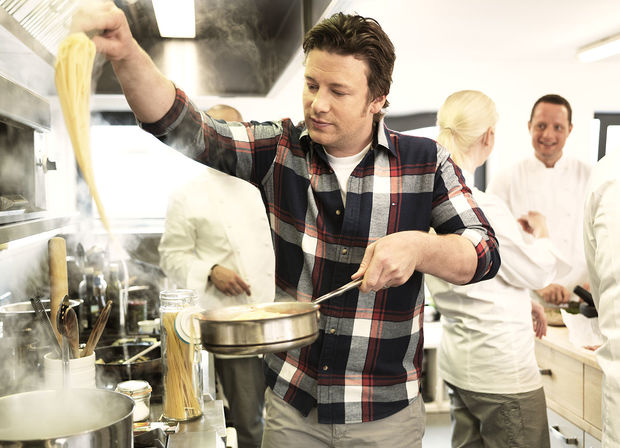
''Once I came on Jamie Oliver with his videos. I thought the things he showed were interesting. At the same time, I did not like much that many things he demonstrated were simplified.'' Photo: standardissuemagazine.com
Speaking about the deficit, how did you handle those uneasy conditions? Did you have to prepare anything great from a minimum set of products?
Great? No (laughing). I was a student when there was nothing in shops. Especially it was noticeable when I was the second or third-year student. I remember that my mates managed to marry at that time, stand in a queue to be able to buy milk for porridge at 4 o'clock in the morning. There was nothing to handle. There was potato and vegetable oil – it is all what students could have. All delicacies started much later.
Did you get an additional degree in culinary?
I did not have any culinary education speaking about studies in certain establishments. I just had a big library of different culinary books in Russian, Spanish, English. I studied on my own, so to speak.
How did your unobtrusive hobby become a popular food blog?
I started to write about culinary topics on different forums on the Internet 10 years ago. Once I came on Jamie Oliver with his videos. I thought the things he showed were interesting. At the same time, I did not like much that many things he demonstrated were simplified.
I started to look for deeper things on the Internet. To my surprise, I found out that there were few authors who taught well, and they all were foreigners. At that moment I thought the niche was not occupied, and I could try showing things that I already knew, understood and found out how to cook them in a video. I created the very blog two years ago. I decided to create it three years ago, that is to say, I prepared and worked for about a year.
What do you mean by depth? Could you explain it?
The thing is that the majority (probably 99,9%) of the videos I have seen in Russian are video recipes that tell how to cook. Such a video doesn't explain ''why this way, not another''. In my opinion, culinary is a science, not a set of recipes. This is why, when I came across a series of shows in English where chemical processes were explained… If you know the principle of preparation, the recipe is not needed, it goes without saying. I lacked such a material, I still do, to tell the truth. It is the main misfortune of books in Russian to a certain degree.
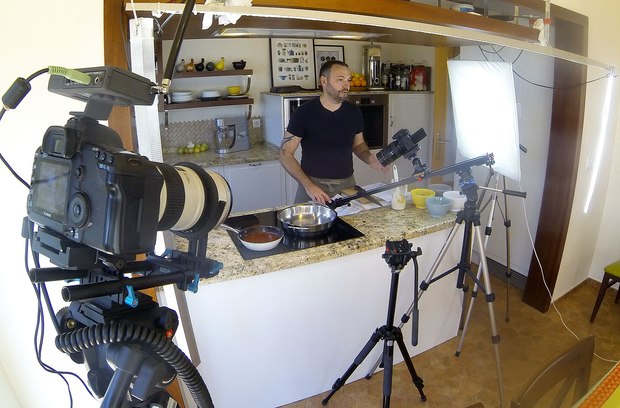
''The majority (probably 99,9%) of the videos I have seen in Russian are video recipes that tell how to cook. Such a video doesn't explain ''why this way, not another''. Photo: vk.com/dmitryfresco
Borsch that Russian women will laugh at and the classic's mistakes
What authors of food books do you orientate to? Do you have authorities?
For me, the word ''authority'' is a kind of absolute, you know. If somebody is called an authority, he is an authority over everything. Among the authors I have read, I notice that an author explains some things great but knows nothing about other things. If an author doesn't say tell anything completely, I start doubting the accuracy of the other information he provided.
Let's put an example of Auguste Escoffier who is a French chef who worked in the late 19 th – early 20th centuries. He has a great book. He almost created an encyclopaedia of French cuisine where he tried to structure the entire idea. I have known what French cuisine for the first time was through this book. It is a thick book that consists of sauce recipes by half. I can give an example: the author tells his reader there is a set of six basic sauces, and if we want to get another one, you need to take the second and fourth basic sauces and add an ingredient to them, and that's it. In other words, in his book, Auguste took a set of bricks and explained their system. It is a correct approach.
Why don't I call Auguste an authority I can follow? If we look at his recipe of borsch, for instance, any woman on the territory of the Soviet Union will laugh aloud. Auguste Escoffier's borsch as close to borsch as, for instance, scrambled eggs. The same thing happens to other books: in some spheres, a certain author can be great, but one step aside is enough to get lost.
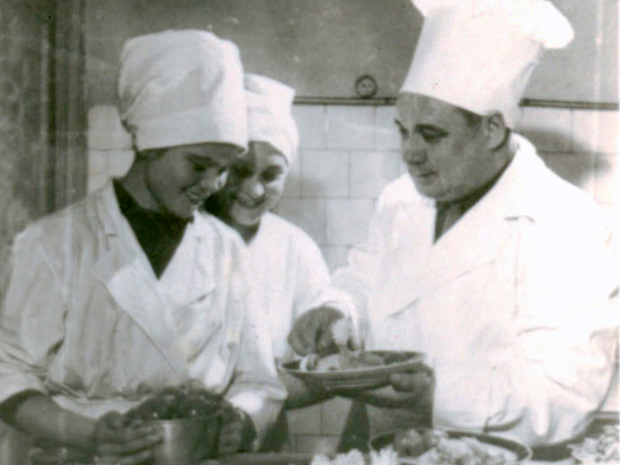
''Probably he is a great chef. But no person in the world who has never eaten, for example, belish will be able to prepare it according to his book.'' Photo: archive.gov.tatarstan.ru
In one of your videos, you severely criticised Yunus Akhmetzyanov's book of recipes. What's the reason?
Probably he is a great chef. But no person in the world who has never eaten, for example, belish will be able to prepare it according to his book. He did not write the most important things in his book. He tells about small belish, peremyach. If I did not live in Tatarstan and if I did not eat both dishes, I would not understand their difference having read both recipes.
He says: ''Make a pie and put it to the oven for 1-1,5 hours. If the oven is hot, cover it with a raw flat cake made of rye flour''. As a technician, I have a question: ''What do a hot and not hot ovens mean?'' In addition, belish can be big like for wedding or small. It can be high or 4 or 5 cm in height. During the written time, one belish will brown, while the other one will remain raw. In other words, he wrote the time but did not tell the temperature.
Then he says that you need to add consommé to the belish. But he doesn't say its temperature. If it is cold, potatoes won't cook. All recipes in his book are correct. But the most important moments are omitted. It is almost impossible to prepare dishes without them.
Probably there are other books about Tatar cuisine, but I could not find them. This information is needed.
Are you ready to write a new book about Tatar cuisine that will be a revised version of Akhmetzyanov's book?
No, because I don't know Tatar cuisine well. The fact that I lived in Tatarstan for 17 years and ate 5 or 10 the most popular dishes doesn't make me a professional, it doesn't make me even a person who just knows Tatar cuisine.
What a book should I write if I learnt to prepare peremyach, ochpochmak, belish and shurpa with noodles?
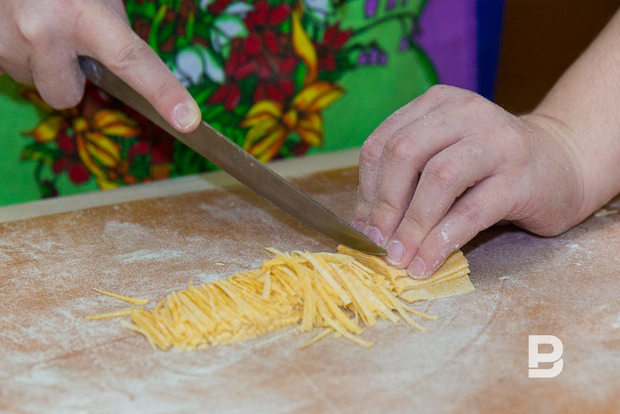
''The fact that I lived in Tatarstan for 17 years and ate 5 or 10 the most popular dishes doesn't make me a professional, it doesn't make me even a person who just knows Tatar cuisine.'' Photo: Maksim Platonov
What do you think about molecular gastronomy? Can Tatar cuisine suit that format? Will it be popular then?
In general, I am very sceptical about molecular gastronomy – it exists because of fashion. It is not very interesting for me because its recipes need unjustifiably much time. And a dish for aesthetes, not a mass consumer, is the result.
Generally speaking, froth, transformation into jelly and deep freeze are the three canons of molecular gastronomy. I think it is too far from tastes of an average citizen of the planet… It is for a handful of people who probably have never tried to be spoiled this way. I think it is for a tired taste. And Tatar cuisine is unique in itself. I don't see any untapped potential, so I think it is not right to rush for that fashion.
High Tatar cuisine
In general, how often do you have to prepare Tatar dishes?
Considering that I prepare new dishes at least four times in a week due to my blog, I deal with Tatar cuisine three or four times in a year at best.
What is your favourite dish?
Belish, of course, with goose meat and dough made with goose fat. By the way, I did not manage to prepare it the way my mum's friend did. I followed the preparation. But it seems that she did not tell me something, some secrets.
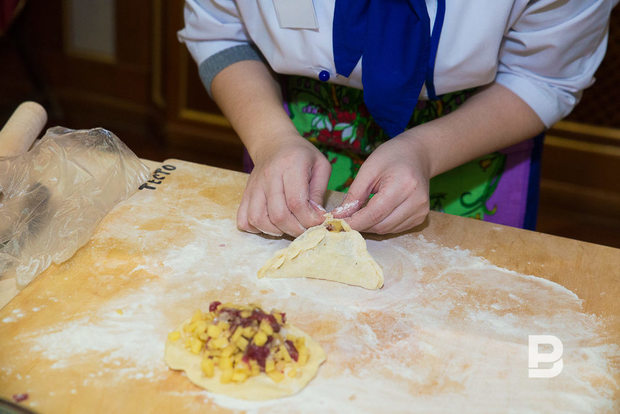
''I don't know if Tatar has a division of high cuisine. But popular cuisine's taste, usually used ingredients are different. Filling, first of all, is the uniting idea.'' Photo: Maksim Platonov
In your opinion, what cuisine is the most delicious/healthy/harmful? What cuisine does Tatar cuisine look like?
I don't know a great number of world cuisines. I am not coquetting, it is true. But I can tell what I regularly meet in everyday life. For instance, I am living in Spain. I see that the local cuisine is nominally divided into two parts as well as Italian cuisine: Spanish cuisine of the aristocracy, which is very exquisite and is not widely spread, and people's Spanish cuisine. The same thing is in Italy. In both countries, cuisine has a lot of dough, potatoes, it is fat but filling. Exquisite food is something less filling but more complicated. I don't know if Tatar has a division of high cuisine. But popular gastronomy's taste, usually used ingredients are different. Filling, first of all, is the uniting idea.